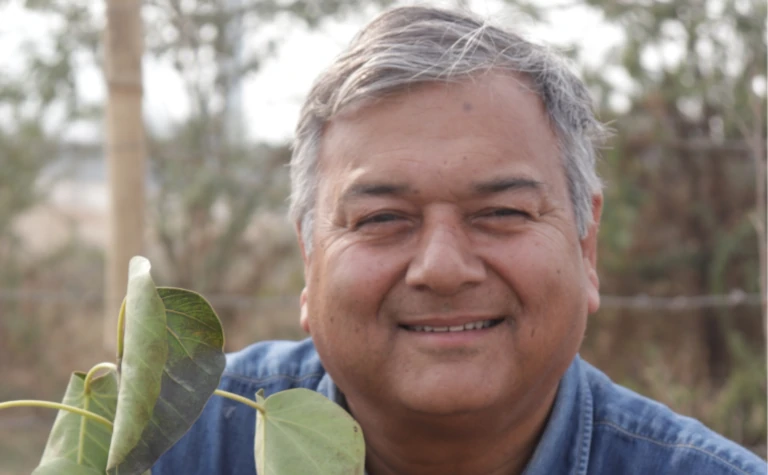Pipal Baba is a well-known environmentalist and social worker dedicated to combating climate change and improving the environment through massive tree plantation drives. His mission is simple: to restore the natural balance of the earth by planting and protecting trees, particularly the sacred Pipal tree (Ficus religiosa), and to raise awareness about the importance of trees in combating pollution, conserving water, and improving air quality.
In this blog post, we will explore the life and work of Pipal Baba, his dedication to environmental conservation, and the impact of his tree plantation efforts on communities and the environment.
Who is Pipal Baba? 🌿👨🌾
Pipal Baba, also known as Swami Prem Parivartan, is a spiritual leader and an environmental activist. He founded the Give Me Trees Trust, one of the largest tree plantation and conservation organizations in India. Pipal Baba has dedicated his life to the cause of tree plantation and environmental sustainability, inspiring thousands to join his mission of planting trees across the country.
His focus on the Pipal tree (sacred fig) stems from its spiritual significance in Indian culture as well as its ecological importance in purifying the air and improving the environment. Pipal Baba has personally overseen the plantation of millions of trees, working tirelessly to ensure that the earth remains green and healthy for future generations.
Pipal Baba’s Mission: Tree Plantation and Environmental Conservation 🌍🌳
Pipal Baba’s life mission revolves around planting trees and educating people about their importance for environmental balance. His focus is not only on planting trees but also on ensuring that they survive and flourish. He believes that tree plantation is the most effective way to tackle air pollution, prevent deforestation, and fight climate change.
1. Give Me Trees Trust 🌱🌍
Through his organization, Give Me Trees Trust, Pipal Baba has planted and cared for over 20 million trees across India. The trust works with volunteers, local communities, and government agencies to carry out massive tree plantation drives in cities, rural areas, and forests. The initiative is one of the largest community-driven efforts focused on afforestation and tree protection.
2. Focus on Native and Sacred Trees 🌳🕉️
Pipal Baba emphasizes the importance of planting native trees such as the Pipal tree and Banyan tree, which have deep cultural and ecological significance. These trees not only absorb more carbon dioxide but also support biodiversity, providing habitats for birds, insects, and other wildlife.
3. Restoring Balance to Nature 🌿🌍
Pipal Baba’s work aims to restore balance to the earth’s natural systems. By planting trees, he seeks to address issues such as:
- Air pollution: Trees, especially Pipal trees, act as natural air purifiers, absorbing carbon dioxide and releasing oxygen.
- Soil erosion: Tree roots help bind the soil, preventing erosion and enhancing the fertility of the land.
- Water conservation: Forested areas help retain moisture in the soil, improving water levels and reducing the risk of drought.
Why Pipal Baba Focuses on the Pipal Tree 🌳
The Pipal tree (Ficus religiosa) is central to Pipal Baba’s tree-planting mission due to its spiritual and environmental importance. In Hinduism and Buddhism, the Pipal tree is considered sacred, symbolizing wisdom, enlightenment, and life. But beyond its cultural significance, the Pipal tree has some remarkable environmental benefits:
- Air purification: The Pipal tree is known for its ability to produce oxygen even at night, making it a powerful ally in combating air pollution.
- Biodiversity support: Its large canopy provides shelter and food for various species of birds, insects, and animals, helping maintain the local ecosystem.
- Long lifespan: The Pipal tree can live for hundreds of years, offering long-term benefits for the environment.
Examples of Pipal Baba’s Impact 🌱🌿
Pipal Baba’s tree-plantation efforts have touched communities across India, from urban areas to rural landscapes:
1. Rejuvenating Urban Spaces 🌆
In cities like Delhi, where air pollution levels are extremely high, Pipal Baba has led initiatives to plant thousands of trees in parks, along roadsides, and in public spaces. These efforts have helped improve air quality, reduce urban heat, and provide green spaces for residents.
2. Empowering Rural Communities 🚜🌳
In rural areas, Pipal Baba’s work has empowered local communities by teaching them the importance of tree planting for sustainable agriculture, preventing soil erosion, and maintaining water levels. His efforts have contributed to better crop yields and improved livelihoods for farmers.
3. Creating Green Corridors 🚴♂️🌿
Pipal Baba has also initiated projects to create green corridors along highways and railways, planting trees that reduce noise pollution and absorb emissions from vehicles. These green belts help to mitigate the impact of urbanization and industrialization on the environment.
The Legacy of Pipal Baba 🌳🌍
Pipal Baba’s dedication to tree plantation and environmental conservation is an inspiring example of how one person can make a significant impact on the planet. His relentless efforts to plant trees and educate people about their importance have helped improve air quality, support biodiversity, and raise awareness about the need for sustainable living.
By encouraging people to plant and protect trees, Pipal Baba’s work reminds us of the vital role trees play in preserving the health of the planet. His mission serves as a call to action for everyone to participate in the global effort to combat climate change and protect our natural environment.
Discover more from Green Ecosystem - Renewable Energy, Agriculture, and Environmental Sustainability
Subscribe to get the latest posts sent to your email.


